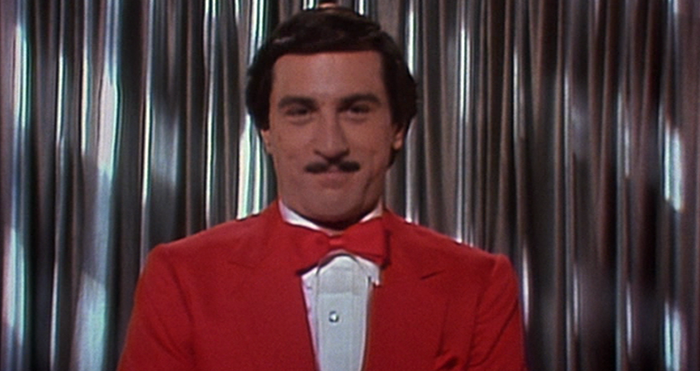
FINAL SHOTS:
PART ONE
stu steimer
Casablanca. Dr. Strangelove. Planet of the Apes. Chinatown. Ask most folks what part of these milestone movies really stands out for them and they'll immediately mention the memorable last scene. And rightfully so - those endings aren't only satisfying, they punctuate and pretty much make you reconsider the entire film. In this series, The Pink Smoke examines some lesser-known finales we feel deserve a spot among the greatest final moments in cinema.
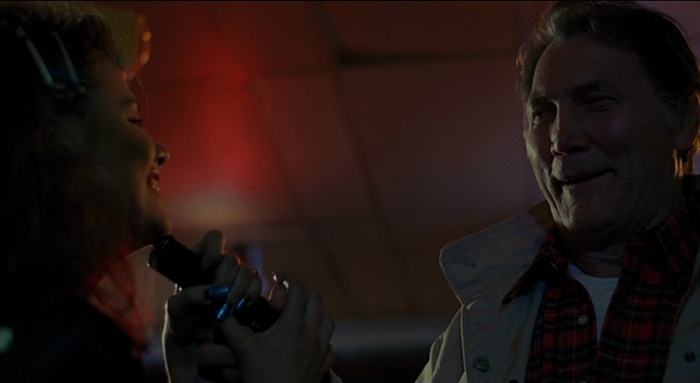
ALONE IN THE DARK
jack sholder, 1982
Some text, of course. Martin Landau and Jack Palance as a pair of deluded psychotics taking advantage of a power failure at the nuthouse to jump ship and terrorize a shrink and his family in suburban upstate New York. This very basic synopsis alone should have provided enough kinetic energy to lift Lemura from the miles deep abyss of the Indian Ocean. The opening dream sequence too - Martin Landau in a sleepy Midwestern diner, plague frogs and raw catfish the only items populating the menu, on the other end of the counter the psychiatrist/cook, Donald Pleasance. Seducing a meat cleaver, delivering a reading from Zephaniah, the Old Testament at its wrathful best, festooned in a paper hat, flames and smoke from grease fire billowing in the air.
Had the movie ended there it would have been perfect. A perfect 60 second spot. The perfect commercial. Doesn't matter what for. Baked lays. Old Milwaukee. Barbasol. Astroglide. Someone probably would have bought it. I might have. Probably, definitely, would have. Not that it would matter. I'm a fussy eater and there's only a few things I'll eat. But commercials and advertisements are rarely successful when they emerge out of the womb of ingenuity anyways. They operate best when processed through the shit factory, a welding of fatuitous ad-nauseum and annoyance designated for embalming synapses to the point where Progressive insurance ads are all that you can ever process, Flo's reflection in my drool as it streams down my chin, catatonic and fried, strapped to the hospital bench, emitting a deliciously acrid stench of Wendy's through my pours – the smell of livers dying and kidneys failing. Same way like the worst songs are always the catchiest. That shitty Daft Punk song is an ear worm eating me from the inside out. But I think I'm sexually attracted to Flo, so I'll take the commercial consumerism as my preferred poison.
But just like my liver and mind, the thrill of Alone in the Dark disintegrates shortly after this incredible opening. The movie doesn’t so much fall apart as much as it just kind of flounders and stagnates into the void of nothingness. That is not to say that moments of brilliance are not peppered throughout - namely almost any scene Jack Palance is in, and there are plenty of great lines here and there, all suggestive of something better – and director Jack Sholder would prove this with his next two features, the endlessly entertaining and criminally underrated parasitic-sci-fi alien-possession-alien-buddy-cop-action-splatter-comedy The Hidden and also the best and strangest Nightmare on Elm Street sequel, the one where Freddy Krueger gets all Jean Genet-like.
But besides from a few fleeting choice scenes here and there, the film is just incredibly dull going forward. Palance, to reiterate, is absolutely incredible in this film, as he was in most of the lesser, more easy paycheck cash grabs of his career; he was one of those actors that could do a commercial for bottled cat piss and I could fall in love with it, wailing in infectious spiritual convulsions like a plant for Benny Hinn. Problem is – it feels like he's barely in it. Landau too feels much too absent, and even Pleasance, whose character is essentially a regurgitated variation of Dr. Loomis from Halloween, feels overshadowed by the rather plain milk toast-ness of the terrorized family which occupies the vast majority of screen presence, company that you pleasantly entertain but it feels like such a struggle to do so. You keep dropping comments about how you have to get up early for work tomorrow, even though your start time isn’t 'til noon, just hoping that they'll take the hint and leave.
And their scenes, every one of them, are just so turgid, so dull, and so ineffectual in every way that I am pretty sure I must have been consciously sleeping during them. On that bench in a Wiseman movie again. It's also been maybe ten years since I watched the movie, rendering it possibly more forgettable than I mis-remember it being given the foggy obliqueness that the passage of time brings in an already fading memory. And although I don't really remember much about most of the midsection, there's one other scene I can't ever forget – the last 30 seconds.
Palance loose in the punk club. Kind of the standard cornball rowdy punk club you're going to find in any early 80's movie. After beating up the doorman demanding a six dollar cover (most punk shows now are a five-to-eight buck cover; can't imagine how much of a rip-off that must have felt like 30 years ago, so the action was probably justified). He wanders aimlessly adrift into a sea of punk kids. Mostly stock Death Wish 3 / Class of 1984 kinfolk. The Sic F*cs are playing, a relatively obscure glam/power-punk band (upon 45 seconds of intense google-based research I could only find record of a single limited LP of them) whose name I don't really dig, but their music – it fits. It's not quite 45 Grave, but I dig it. Catchy shit. They're playing a track called "Rock or Die" now, a wonderfully repetitive up-tempo track employing this strangely majestic aura of syncopated poppy-feel-good-nihilism perfect for the sequence to follow. Before Palance can make it to the stage he's stopped by some punk girl. About 20 or so.
She starts babbling to Palance about some punk band that was there the other night, with some generic punk-band-in-an-80’s-slasher name. Glue Huffing Punk Puke Dolls or something like that. Palance is gripping his gun, slowly raising it towards the girl as she insists that she's seen him here before. "You were in here Tuesday night." Palance recoils backwards slowly, his face losing slack, and festering with discomfort. She keeps recanting this as she assists Palance in shifting the gun upward to her jawline. Cut to black. Inevitable gunshot.
I'm not exactly sure what the hell is even supposed to be going on here, and I don't really know if anyone else does for that matter. I seem to vaguely remember a scene at this club occurring earlier in the movie, but it also being rather insignificant, neither Palance nor this punk girl really having been prominently featured in that scene. I could go back and revisit it for sure but I am unwilling to for a couple of reasons. One, as I have already established a couple of times, the movie as a whole is a bore, and secondly...I'd much rather prefer to not acknowledge a logical sequence. As it plays out in the movie, it's so incredibly weird, eerie, creepy, funny, incendiary, cheesy, and surreal that its vagueness acts as a compliment, a completely necessary element to its effectiveness. Is it a display of trappings of existential entropy, where the psychotics together find home and solace in a far more insane world? Or just some ridiculous underdeveloped cinematic non sequitur? Who cares. Either one works.
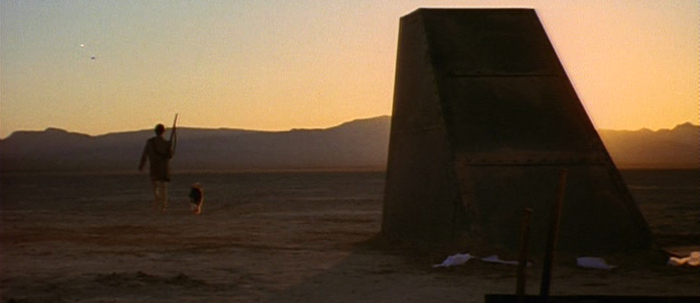
A BOY AND HIS DOG
L.Q. jones, 1975
And while I'm on a tangent of incendiary and nihilistic endings, this one might eat the bar if you don't include the Ricardo Lopez home movies.
A Boy and His Dog has often been criticized for being misogynistic. Harlan Ellison's novella has, too. I've never read it. I can't say if it is or isn't. But I hear it's good. I like Ellison. From what I have read. "Shatterday" is really his best. You really must read it. If you do get the chance. And you know what, Harlan Ellison really likes A Boy and His Dog too. Though. Maybe... Maybe not all of it. Those pesky last lines of the film – which occur moments after the suggestion of Vic and Blood eating the film's only prominent female character – Quilla:
Vic: She said she loved me... Aw hell, 'wasn’t my fault she picked me to get all wet-brained over.
Blood: Well, she certainly had marvelous judgment, Albert, if not particularly good taste.
The film then closes on Vic and Blood, walking off into the barren post-apocalyptic terrain.
"Moronic" and "chauvinistic" – these are two terms Ellison has used to describe the final productive of L.Q. Jones' creative license. Having never read the source material, but knowing of it, and basically how said source material ends, I certainly understand. And I can't say I completely disagree either. I love the last lines, the last shot – Vic and Blood yucking it up, sharing this gentle moment between the two of them as they stroll down the wasteland under the veil of an emerging golden dusk. The beautiful friendship continues.
The novella apparently ends with a very different tone – one that's intended to be more thought-provoking than a bad line delivered by a hack dead-end comic on a cold and dreary open mic night in 1987. No doubt Ellison must have felt undermined by the film's conclusion. It ends with a joke – not a particularly good one. A really bad one. You half expect the whole scene to meld into a freeze frame. Followed by exactly six seconds of canned studio applause from an audience that doesn't exist before the credits cut across the screen in classic bold Helvettica synced up to the Night Court theme. It's terrible. Really, really terrible. And also great.
Is the movie misogynistic? Probably. Quilla is the only female character that is really given any kind of substantial role beyond a disposable fuckbox – and even then she's a character all-too-ready to put her male counterpart's balls in a vice under lock and key. But the movie is really, ultimately flat-out misanthropic satire more than anything else. Because society breaks down, all semblance of even the most basic civility – like going a few day without seeking out someone to rape – goes with it. Intended or not. Mostly not.
This last scene, last shot, in all its clichéd borderline offensive cornball jokiness, is casually cruel. I see it as a love story between two psychopaths, just two in a sea of psychopaths, only difference is they are more interesting than the nameless lot that surrounds the ditch. It's a cynical take on a cynical film, but I could care less. I'm writing this a few days before Christmas. I'm bleeding cheer from all orifices tonight. I wonder why I picked this.
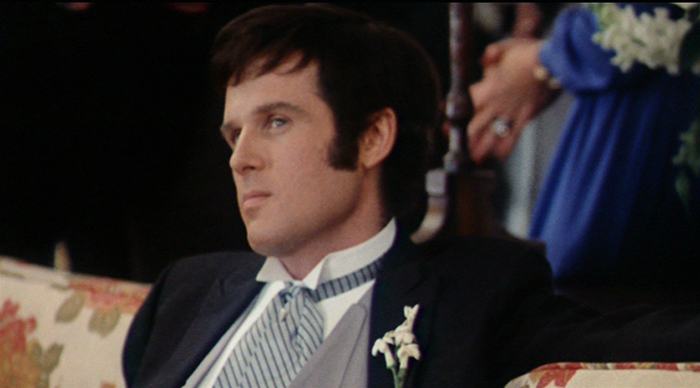
THE HEARTBREAK KID
elaine may, 1972
Elaine May's The Heartbreak Kid has often been compared to The Graduate. I see it. I understand it. But if The Graduate were the Beatles of late 60’s/early 70’s anti-romantic young-man-in-transitional-life-crisis tragicomedies, then The Heartbreak Kid would surely be the Kinks. Sure, maybe not quite as highly regarded and never as popular, and never will be as popular, as its cousin hogging up the limelight, but the truth is – it’s just a far superior act, in all ways. Most won't admit it, but it's true. Sadder, funnier, smarter, more lyrical and interesting in its trajectory. In truth, I'm bored with the Beatles and I'm bored of The Graduate. So why continue this meaningless analogy.
Charles Grodin gives probably the best performance of his entire career as Lenny Cantrow, an over-achieving under-achieving sporting goods salesman who is consistently on the pursuit of obtaining the better, finer things in life, including replacing his recent bride, Lila (played by Jeannie Berlin, daughter of May), with younger and prettier shiska Cybill Shepherd, who upon a chance encounter on the beach during his honeymoon he begins to pursue in a manner that can be defined as nothing less than stalking. Cantrow is a liar, a phony, and a sociopath – yet he's so goddamn affecting. When I call the character a sociopath, I really mean it. Everything he says and does is horrible, but not in that meticulous, premeditated way that makes the characters in a Neil LaBute play horrible – because through all the character's lying, deceptions, and hilariously incendiary dialogue he remains to be completely blind and oblivious to it all, completely unaware of how much of a creep and a loser he is. Kind of like one of the characters from It's Always Sunny before I stopped watching the show.
Lenny telling his wife it's over during the last night of their honeymoon is demonstrative of the ingeniously uncomfortable wit of the film. She bawls out in tears, hyperventilates and holds back from vomiting all over the pecan pie while he attempts to offer up all the compassion and humility he can suffice: consolation prizes. "I'm going to give you...the car, I'm going to give you...the luggage, all the wedding presents. You know, for a marriage that's not a week old, that’s pretty good..." followed by hurried prompts of the annulment: "If we can... I'd like to settle this tonight because, you know, check-out time is tomorrow at eleven in the morning."
The narrative is circular. It begins with a wedding and ends with one. He panders to his new bride's family, and then ends up on a couch with two ten year olds. He attempts to pander to them, feeding them the same bullshit lines about his false ambitions, about vague desires to "give something back to this country." He asks the kid sitting next to him how old he is. "Ten," he says. "...I was ten once..." Cantrow says, marred with opaque sadness as his eyes droop to the floor. The kids get up and leave. They can't stand him either. Now he's alone on the couch, humming "Close to You" without any semblance of joy or enthusiasm. Instead just looking completely unhappy, unfulfilled, and now more alone than ever.
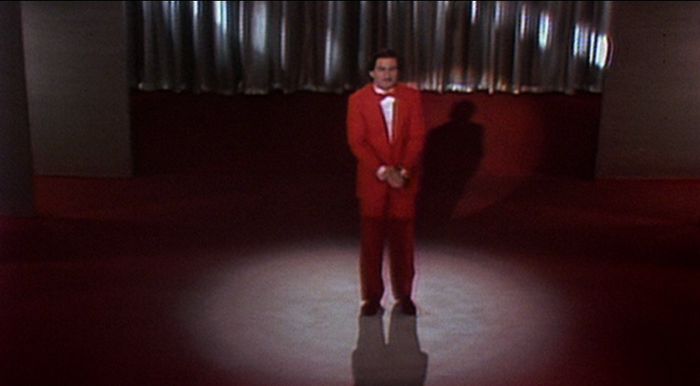
KING OF COMEDY
martin scorsese, 1982
The last shot of King of Comedy can be compared to the last couple scenes of Taxi Driver. Much like the rest of King of Comedy can be compared to Taxi Driver.
Rupert Pupkin and Travis Bickle are both nuts. Let's establish that first before we delve further. But Travis Bickle's mental state is one cemented with more validity than Pupkin's. Maybe. Bickle, though an obsessive lunatic, comes from a more identifiable place. Nuts in an R.D. Laing sort of way. The world is nuts, out of orbit, spiraling into the sun – insanity seems about as appropriate a response to it as any. Pupkin fits well into place in this world. He has no idea of his own dangerous sycophantic-cum-megalomaniacal delusions. In that way, he's more frightening than Bickle; actually, not really – I'd be more worried about the guy with the gun storming the hallway than the talentless fame-hungry asshole in the apartment next door.
Regardless.
The ending of King of Comedy is a matter of interpretation. A matter I myself haven't found a fitting or definitive interpretation to on a personal level. Whereas I feel the coda of Taxi Driver IS a complete fantasy of Bickle's altruistic but deranged mental state (anything other than that, to me at least, feels like contextual betrayal), King of Comedy for me has two endings. And both work. Either Pupkin has achieved that level of fame and adoration that he spent the entire movie searching for, not through means of perfecting any skill or latent talent, which he never seemed wholly that interested in to begin with, but by doing something stupid to make him infamous in order to construct that platform of celebrity. It works in the movie. It works in real life, too. You can kill and eat a person, do your standard fifteen months of hard time, and find work as a celebrity commentator and get a gig penning restaurant reviews on the side. But I’'m speaking from an angle of resentment. I can't afford to eat ass. So I digress.
And if that's not the case, then Rupert is simply now much further gone than he has ever before - just another peaking extension of his delusion. The announcer during the end scene alone alludes to this. His only lines seem to be repeating Pupkin's name over and over ("Ladies and Gentleman...Rupert Pupkin! Rupert Pupkin, ladies and gentlemen! Rupert Pupkin!") Pupkin, finally satisfied in that suit as bright as a stop light, clasps his sweaty palms together and stares at his audience with a crooked unhinged smile that slips off his face like one of Dali's melting clocks. He says nothing, because for all his drive and ambition he really has absolutely nothing to say. Instead the film cuts to black, Van Morrison’s "Wonderful Remark" bringing us out with melancholic Van Morrison-ey lyrics like, "How can we ever feel the freedom/ Or the flame lit by the spark / How can we ever come out even / When reality is stark" that ring a shade or two more somber than even the saddest tracks off Astral Weeks save for "Madam George" and "Slim Slow Slider."
I've always felt Scorsese was extremely under-acknowledged and underappreciated as a comedic director. I love the absurdity of After Hours, Goodfellas had shared poignancy with blunt-force humor, and Wolf of Wall Street was undoubtedly his best work since then. King of Comedy is a comedy. And yet I think it's perhaps his darkest and most cantankerous film percolating under its light exterior. The ending is unclear, but so is Pupkin as a character. He's impenetrable and kind of alienating, but he fits in well with this world a the end - be it real or not.
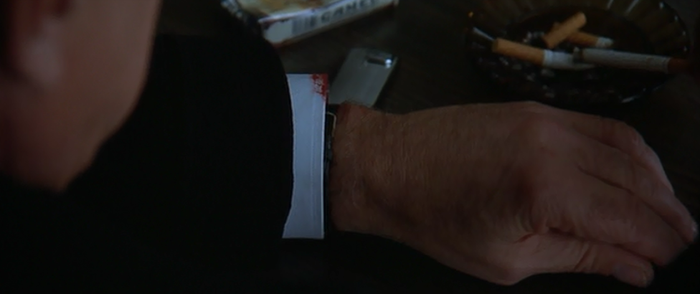
HARD EIGHT
paul thomas anderson, 1996
Hard Eight was Paul Thomas Anderson's first film. It's not his best film. It's flawed, flawed in most of the ways that a first feature often is. It feels truncated, like there's something missing – yet there are things about Hard Eight that I like better than the cumulative of Anderson's output in the next half dozen films to follow. Putting my biases on the table, I'm a pretty big fan of most of those films; I even liked The Master better than most, despite its inherent flaw of having virtually no third act. I'd categorize him with Andrzej Zulawski and Fassbinder in that I'll probably watch anything he does – unfortunately Fassbinder's been dead for longer than I've been alive and Zulawski is unlikely to now emerge with late-stage-Malick-like proliferation in his later years (I really don't have much interest in seeing any of the next 25 Malick movies in production, but have all invested interest in seeing Zulawski's return with Cosmos).
But all those biases aside, I like this movie more for Philip Baker Hall's performance than necessarily Anderson's writing or direction. It rivals that of Lieutenant Bookman, and it rivals a ranting Nixon in his PJs weighted down in the trenches of suicidal paranoia, guzzling down scotch in the president's chambers bitching about the Jews in front of a wall of closed circuit security monitors.
The original cut of Anderson's film ran about two and half hours long, the version that exists just peaking over a hundred minutes. Perhaps in these missing 70 or 80 or 90 minutes the relationship between Baker's character Sydney and John C. Reilly's John was better established beyond what it is in the final and only available cut of the film, to which Samuel L. Jackson's character shows up to provide the exposition and backstory that Sydney, a man who seemingly just picked up a random stranger off the side of the road, was also responsible for murdering John's father. From my memory – and it has been awhile since I last watched Hard Eight, and when I did I had just killed off half a quart of Old Grandad, splashing it with Code Red Mountain Dew because that's all I could find as a mixer (you'd be surprised – it's actually every bit of a horrible idea one would think) in about an hour and a half, so perhaps my memory doesn't serve with the greatest reliability here – but I remember thinking, "Shit, I might have missed something."
But logisticians are the kind of people that will get hung up on semantics. A bunch of party poopers. Can't stand their interjections and critiques of works of fiction. Lapses in narrative are fine. I can't enjoy a procedural as much as the next person, but hang-ups on the minutiae can be vexing to me as well. Usually I'm not paying attention to what's going on anyways.
What sticks with me about Hard Eight is that it draws to such a strong ending that it's kind of anticlimactic. Sydney snuffs out Samuel L. Jackson. Cleans up the assault at the hotel. John C. Reilly and Gwyneth Paltrow elope to Niagara Falls and there's a sweeping sense of resolve – a resolve that immediately evaporates with the film's final shot recalling Lady Macbeth attempting to wash the blood from her hands - perhaps the most powerful, yet subdued, three or four seconds of not only anything Anderson has ever done, but probably from any movie of the 90's.
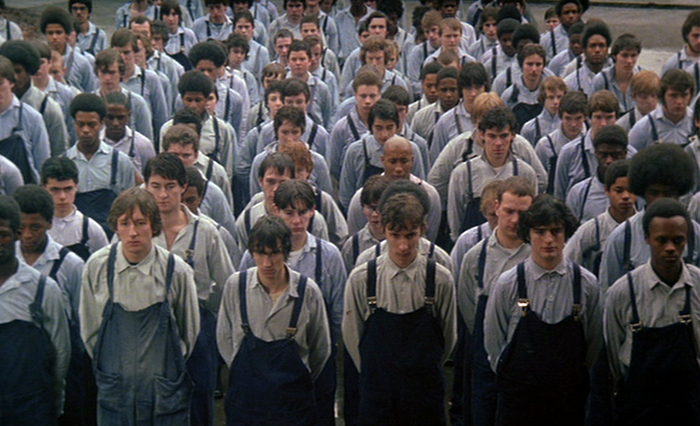
SCUM
alan clarke, 1979
The first Alan Clarke movie I ever watched, still probably his most accessible work. I watched it maybe a dozen or so times in high school. Still remember how the VHS reeked of mold, stale lettuce and urine, too potent to be of human origin. But beyond that – I don't really remember the last time I watched this one. It's probably been ten years. At least ten years. I watched it for the first time the other night in who knows how long. I think I failed to see, or remember, much of the humor that is present in much of the first half of the film. I was also drinking cough syrup and wasn't really paying much attention. Whole time I thought I was watching the second Meatballs movie. I was really hoping for that resident party alien to make it back to his home planet and for The Croog to finally lose his cherry to the counselor behind the slop hall. Instead everyone just gets raped and killed and no one really cares.
As I said – Clarke's most accessible. The majority of Clarke's other works, at least excluding some of his later oddities like the Ken Russell-inspired Billy the Kid and the Green Baize Vampire * – were closer to being descendants of Bresson. Scum is a lot more stylized, and sticks to a more conventional narrative than, say, Elephant, Contact or Christine, which may be my personal favorite. But the last shot in Scum has always resonated with me, generating much stronger feelings than anything else Clarke has done, at least until I discovered the fruits of rampant memory-degenerating alcoholism. Scum simply ends in a fitting and ironic moment of silence. No hint of resolve, but every suggestion of a widening gulf between prisoner and inmate.
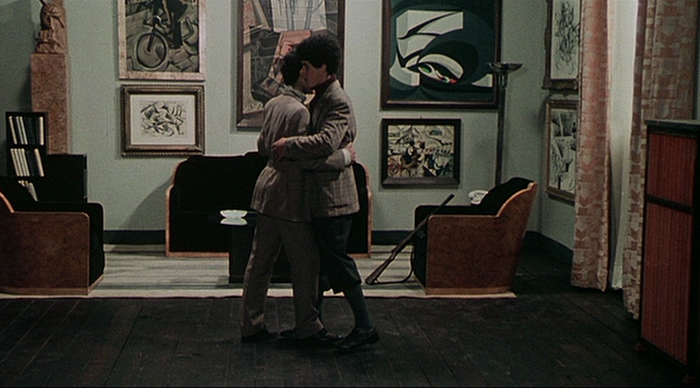
SALO OR THE 120 DAYS OF SODOM
pier paolo pasolini, 1975
I probably watched Saló for the first time when I was probably 15. I realize I'm not very mature now, but I was a complete paint-huffing moron at 15, as most 15-year-old boys are in America. I'm sure I watched it because I heard about how gross it was. The shit-eating. Because I never advanced past the anal stage in Freud's development model. And I'm sure I was attracted to it for the fabricated sensationalistic conspiracy theories that linked this film in particular to Pasolini's eventual murder. Which I guess makes more sense than the long-reported "official" story: Pasolini being run over a half-dozen times, his testicles smashed in, bones shattered and body set on fire and thrown off a cliff by a meek teenage boy in an attempt to snatch his wallet. The back cover of the 1992 Random House addition of Pasolini's novel A Violent Life even alludes to this being the case.
Though we are overlooking the possibility that the kid might just have been very green and clumsy, plagued with a particularly aggressive case of butterfingers.
I know I watched this movie when I was probably 14 or 15, but I don't really remember what I thought of it. I know a few years later I looked back on it and hated it. That too – I don't really remember why that was. Probably because someone else liked it. Years after that, I slowly began to appreciate it more and more. As horrible and cruel as the film is, and for as much provocation as it inspires, it is anything but a debasing exercise in cruelty and cheap exploitation.
The film is the first of Pasolini's planned, but obviously never fully-executed, trilogy of death. And these themes of death and destruction are precedents that are set in place pretty early on in the film as we witness the children being kidnapped, and one being executed, before the opening credits have ceased. I wonder if the other two planned films would have made for lighter viewing.
We are in the final days of the war. Mussolini's Italian Social Republic is in decline. But those factors neither decimate nor impede the dominance the masters hold over the chateau Saló - instead it establishes a pathway that will lead to the film's grizzly epoch and final apocalyptic canto. We are not going to view the defeat and conviction of the guilty. We are following a mass-murderer as he prepares to be taken down in a wave of bloody suicidal flames. There will be no escape, no rescue, and no successful resistance for the prisoners. That becomes deadening apparent very early on. The victims are nameless, stripped of humanity, and so they are credited in the closing credits as only one of two titles: Male Victim, Female Victim (likewise their captors are credited with the roles they portray, the power holders in aristocratic society: The Duke, The Magistrate, The Banker, The Bishop, The President). And although their servitude is entertained in the games and rituals depicted on screen that aided in much of Saló's controversy, their worth is limited, as is true in the case of any domineering fascist regime that employs the undesirables into some form of servitude, be it labor or otherwise – annihilation remains the static, unmovable feast. The victims give in to their masters, engaging in betrayals of their fellow captives in a desperate attempt to save themselves, though all of it in futility. And so we reach liquidation, a point of destructive finality – The Circle of Blood.
The grotesque imagery of Saló occupies itself in cinematic-cultural memory with something akin to urban legend. Anyone with even a fleeting glimmer of awareness of the film knows about it. They can tell you it's the one with all the shit-eating and genital mutilation whether or not they have actually seen it, much in the same way that I've never actually really watched the Star Wars movies but could probably describe them to you as if I had. And yet the most unsettling scene in Saló, perhaps one of the most haunting closures in modern cinema, features none of that – at least not to a direct degree. Two guards, roughly the same age as most of the captives, are held up in the chambers. They look so bored by it all, irrevocably jaded even as the sexual tortures are in full-swing out in the yard. A radio is playing. One of them gets up, goes to the dial and changes the station. The two guards get up and dance, discussing girlfriends, innocuous details of life and adolescence, with the willingness to turn blind eyes, ignoring the wave of barbarism, and flipping off all empathy as easily as the turn of the radio's dial, fostering obedience and acceptance to a reckless unquestionable authority.
* The only film I can remember seeing in which the main character is an up-and-coming snooker player!
— john cribbs








